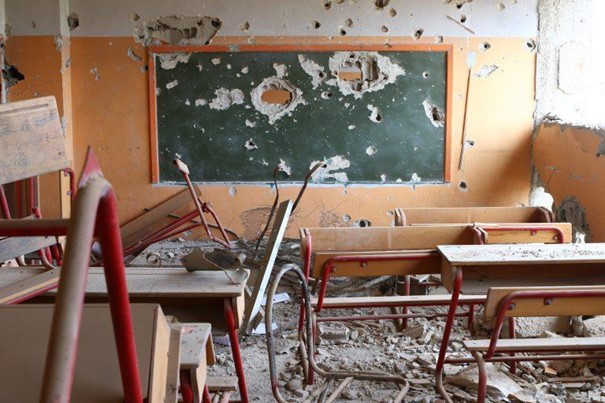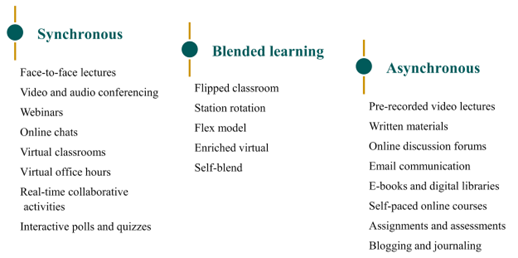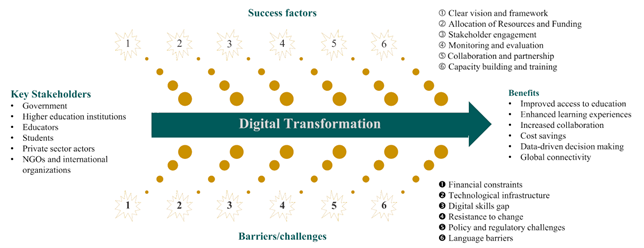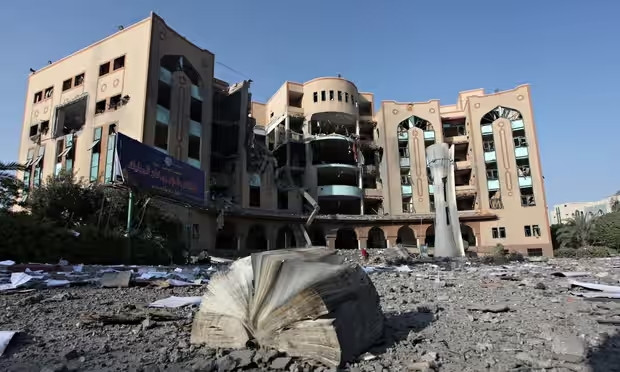Photograph: APAimages/REX
Armed conflicts severely disrupt lives, destroy educational infrastructure, and hinder access to learning, demanding innovative digital education solutions for continuity. This article explores the transformative role of digitalization in advancing higher education within conflict-affected societies and examines the challenges of digital adoption. The focus is on overcoming barriers to ensure accessible, quality education through digital platforms, aiming for resilience and inclusivity in education systems amidst adversity. The framework indicates the importance of developing digital infrastructure, capacity building for educators, e-learning platforms, digital content, and public-private partnerships. These measures are pivotal in expanding access to education, encouraging collaboration, facilitating remote learning, and improving the global competitiveness of individuals in war-torn regions.

A school destroyed by the conflicts in the rural Damascus
Source: M. Abdulaziz, UNICEF
Digital Transformation in Education
Higher education in conflict-affected societies faces unprecedented challenges, from damaged infrastructure to disrupted academic schedules. In a world increasingly reliant on digital connectivity, the digital transformation of higher education emerges as a pivotal opportunity to rejuvenate the educational landscape in regions ravaged by conflict, such as Syria. This shift towards digitalization introduces resilience against the myriad physical and socio-economic obstacles imposed by ongoing conflicts, facilitating access to inclusive and flexible learning opportunities. Digital shift refers to integrating digital technologies into various aspects of society, fundamentally changing how organizations operate and deliver value to their stakeholders. In the context of higher education, digital transformation encompasses the adoption of technologies such as online learning platforms, e-libraries, and digital communication tools, as well as the growth of digital skills among educators and learners. Remote teaching can be conducted through synchronous (real-time) or asynchronous (self-paced) methods, depending on the needs of students and the availability of resources, as illustrated in Figure 1. However, the journey towards the digitalization of higher education in conflict-affected societies faces significant barriers, primarily rooted in the infrastructural and socio-economic landscape of these regions. Initially, the destruction or inadequacy of physical infrastructure, such as buildings, electricity, and internet hardware, poses a fundamental challenge. Educational institutions struggle to adopt digital technologies without the basic premises for a stable power supply and internet connectivity. Secondly, the digital divide becomes more pronounced in these settings, where internet accessibility is scarce and often non-existent. Many areas remain disconnected from the global network, making online education a distant reality for the local population. Lastly, socio-economic factors further complicate digital adoption. High poverty rates, limited digital literacy, and the cost of digital devices create an environment where even if digital resources are available, they are not accessible to everyone.
The journey towards the digitalization of higher education in conflict-affected societies faces significant barriers, primarily rooted in the infrastructural and socio-economic landscape of these regions.

Figure 1. Synchronous, asynchronous, and blended learning approaches in higher education
Challenges and Opportunities
The digitalization of higher education in conflict-affected societies presents challenges and opportunities. Key concerns include the risk of exacerbating the digital divide, where the poorest and most marginalized have limited access to digital technologies, potentially widening educational inequalities. There is also the issue of ensuring quality education through digital platforms and the need for robust cybersecurity measures to protect students and institutions. Comprehensive policy and support frameworks are essential to effectively implement digital education in conflict-affected areas. Governments must enact policies that promote digital infrastructure development, ensuring reliable internet access and the provision of digital devices to students and educators. Equally crucial is the role of international and non-governmental organizations (NGOs), which can offer financial aid and technical expertise. These entities can assist in deploying digital learning platforms, training educators in digital pedagogy, and developing localized educational content that is accessible. Collaborative efforts between local governments, international bodies, and the private sector are vital in creating resilient, inclusive, and adaptable educational environments. Through such partnerships, digital education can transcend barriers, offering quality learning opportunities to those in the most challenging contexts. The proposed framework for digital transformation in Syrian higher education is designed to address the critical challenges identified through the literature review, expert interviews, and case analysis. This framework comprises four main components: digital infrastructure, e-learning platforms, digital content, and capacity building. Figure 2 indicates the interplay between the various elements contributing to successfully implementing digital transformation initiatives in Syria’s higher education sector.

Figure 2. A comprehensive overview of the key stakeholders, benefits, barriers, challenges, and success factors for digital transformation in Syrian higher education
Conclusion
Digital technologies facilitate continuity in education during times of instability and introduce innovative teaching methodologies that can enhance student learning outcomes worldwide. Digital transformation offers a critical solution to the challenges faced by the higher education sector due to conflict, enabling access to education and fostering a resilient, inclusive system. This article highlights the need for remote teaching, capacity building, and improved infrastructure as key strategies. Higher education can ensure quality education for all, contributing to the country’s recovery and future workforce development by embracing digital technologies and collaborative approaches. Implementing digital transformation is essential for educational resilience and long-term growth. However, achieving this potential requires concerted efforts from various stakeholders. Governments, educational institutions, international organizations, and private sector partners must collaborate to invest in the necessary digital infrastructure and policy frameworks supporting the scalability and sustainability of digital education initiatives. This entails improving internet connectivity and access to digital devices, developing comprehensive digital literacy programs, and creating inclusive, context-sensitive educational content.
Higher education can ensure quality education for all, contributing to the country’s recovery and future workforce development by embracing digital technologies and collaborative approaches.
Further Reading
Aljawarneh, S. A. (2020). Reviewing and exploring innovative ubiquitous learning tools in higher education. Journal of Computing in Higher Education, 32, 57-73.
De Wit, H., & Altbach, P. G. (2021). Internationalization in higher education: global trends and recommendations for its future. Policy Reviews in Higher Education, 5(1), 28-46.
Fernández, A., Gómez, B., Binjaku, K., & Meçe, E. K. (2023). Digital transformation initiatives in higher education institutions: A multivocal literature review. Education and Information Technologies, 1-32.
Habib, M. (2023). Digital transformation strategy for developing higher education in conflict-affected societies. Social Sciences & Humanities Open, 8(1), 100627.












































